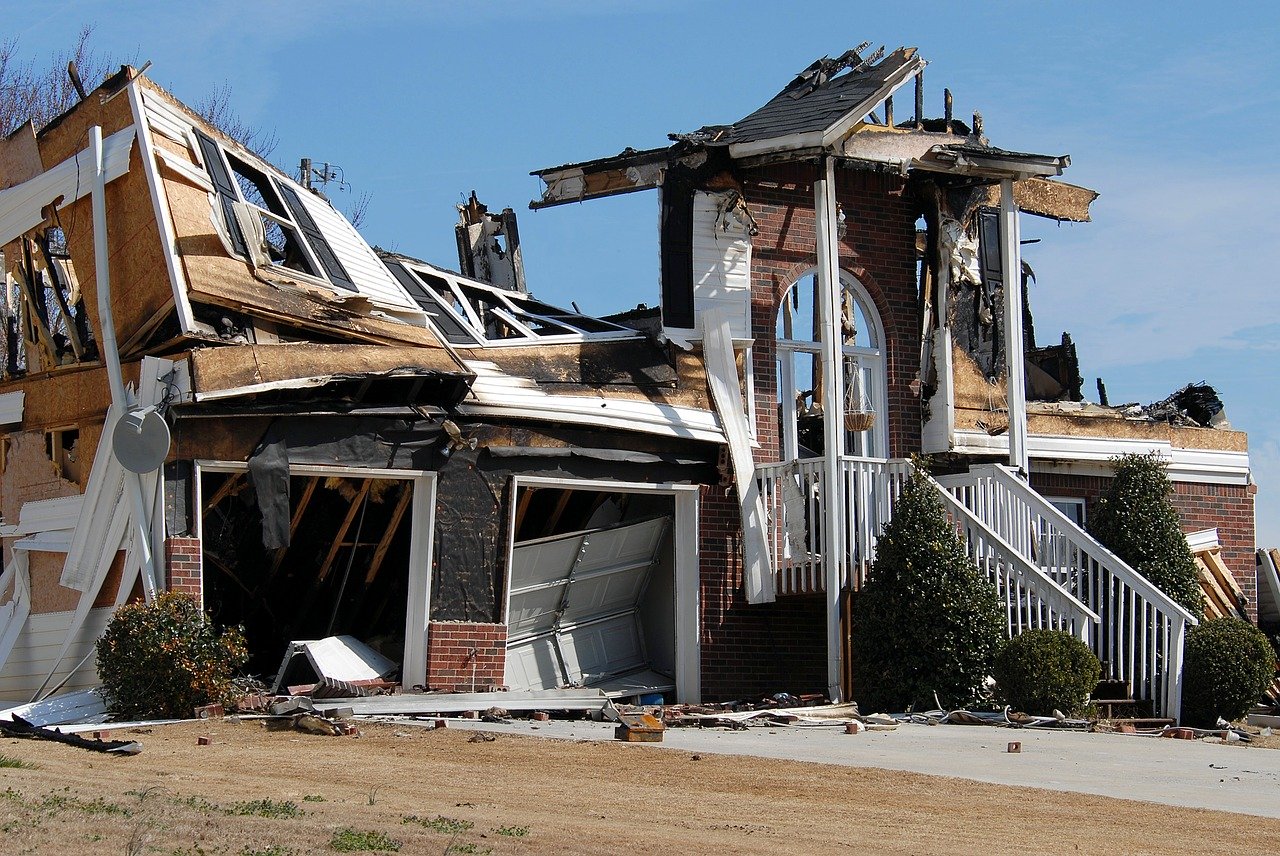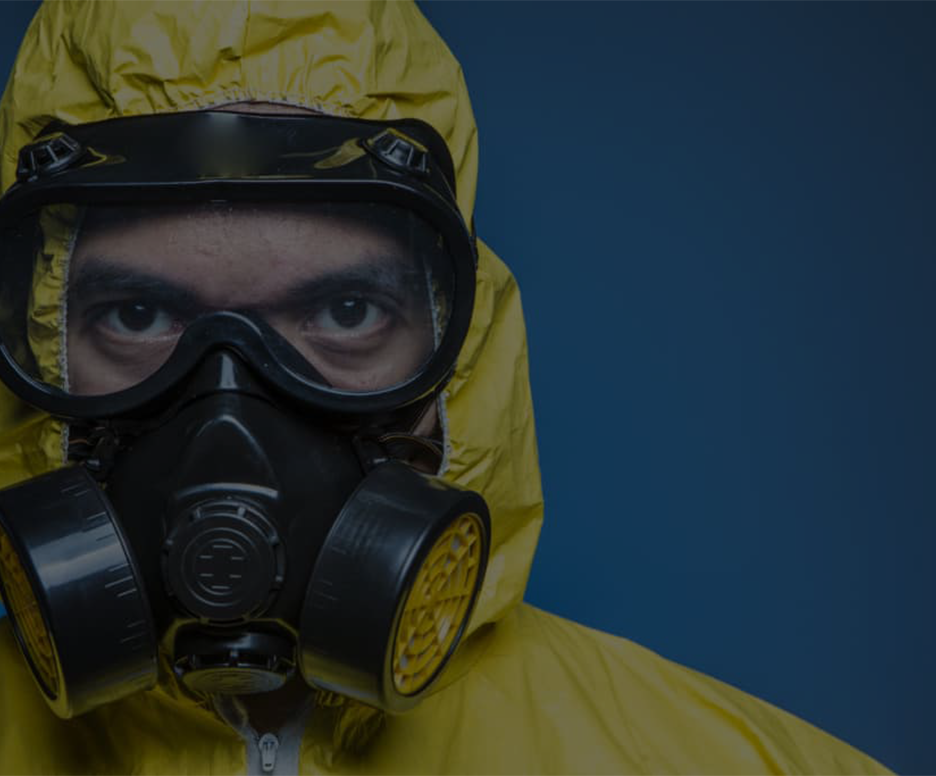
Fire Damage Tips: 6 Hazards That Most Property Owners Miss
By: 911 Water Damage Experts
Fires can cause a whole world of damage. Small or large when fires are put out, it takes a trained eye to inspect and manage both the most obvious and the most subtle of damages.
Below we highlight 6 fire damage tips and hazards that many property owners miss and should fix right away before it’s too late.
Let’s get right into it.
Fire Damage Tip #1: Look At Wiring And Electric Damage
Most people know that water and electronics don’t mix. And even if your dishwasher, washing machine, or even your gaming console look as good as new, that might not be the case.
Most electronics have a plastic insulation coating around the wiring to keep it safe. Intense heat can melt that away or cause internal wiring damage. The plastic on the outside might even look okay, but the wiring inside can be a dangerous mess. Before you plug in your seemingly-okay appliance, take it to an expert for testing.
Fire Damage Tip #2: Inspect For Water Pipe Damage
The tricky thing about fire damage is that you don’t always see it all. You will definitely know that you need a new lounge suite, bed, or dining table, but what’s going on behind seemingly fine walls is not all that obvious.
At least not to the average homeowner. Still, it’s crucial not to neglect the parts of your home you can’t see, even if you think they are okay. Intense heat from a fire is more than capable of melting plastic pipes. Even metal pipes are not averse to the risk, as heat can destroy seals and cause leaks. Leaking pipes can lead to even more damage, not to mention an increased risk of electric damage.
Fire Damage Tip #3: Check Your Gas Supply
Equally as crucial as water pipes are gas pipes, and these too, are at risk in the after-effects of a fire. Even if your gas pipes were not directly exposed to flames, that doesn’t mean the fire’s heat didn’t do any damage. Both plastic and metal pipes are at risk of damage when exposed to excessive temperatures. Metal pipes, in particular, can expand and contract with rapid heating and cooling.
A side effect of this is a potential gas leak. Even if a gas leak didn’t cause another fire, it can have some lethal consequences. But it’s not just your pipes that are at risk, but boiler systems too. If you have filters or vents that draw in air, then it’s worth checking these for clogs due to smoke damage.
Your home’s venting and pipework can both suffer from fire damage, so consult an expert without delay.
Fire Damage Tip #4: Inspect For Dangerous Particles
It can be strange to think that, even once the fire is out, you’re still at risk. The reality is, the effects of a house or building blaze can linger for some time. Plastic, painted materials, and even some construction materials can release toxic gases when burned. Particles and gasses can then remain in the air for some time.
If you are going to be entering a property after a fire, make sure you wear the appropriate protective clothing and face protection. Proper ventilation of the property can also lessen the harm. If you built your property before 1990, then there’s also every reason to believe that it also contains asbestos. Asbestos is a naturally-occurring mineral that used to be popular in building materials, flooring, roofing, siding, and more.
Eventually, it was found to be a leading cause of certain cancers and conditions such as mesothelioma and asbestosis. When exposed to flames, tiny asbestos fibers can be released into the air. Once inhaled, these fibers can stick in lung tissue leading to inflammation and, eventually, possible cancer.
Fire Damage Tip #5: Structure And Water Damage
In the same way that fires can cause water and gas pipe damage that you can’t see, it can also cause hidden structural and water damage.
Wood, of course, is particularly prone to fire damage, but brickwork and steel are not protected from it either. Failure to carry out thorough inspections of all structural elements can result in weaknesses, damage, and collapse in the future.
Fires can cause considerable damage, but the means for extinguishing them can, as well. Thousands of gallons can be pumped into a building for putting out a fire, and this can be equally as damaging as the flames.
Make sure you hire experts to check wiring, heating systems, and to look for hidden water pooling, mold, wall structure damage, and water system contamination.
Fire Damage Tip #6: Check HVAC Systems
Heating and air conditioning systems have a pretty important job to do. They keep you cool in summer and warm in winter.
But they can become your worst nightmare after even a small fire if you don’t get them checked. Smoke and harmful toxins can build up in ducting and vents. Once you use them again – weeks or months after a fire – they can distribute those particles and odors throughout your home.
While you’re organizing water damage experts to help you with water damage, ask if they can check out or know people who can check out your heating and cooling systems, too.
Fire Prevention Tips
Overloaded Power Strips And Extension Cords
Using too many appliances or devices on one power strip can cause it to overheat, increasing the risk of an electrical fire. Avoid daisy-chaining multiple power bars, and invest in surge-protected strips rated for the devices you’re plugging in.
Dust and Pet Hair Around Electrical Outlets
Fine dust, pet dander, and lint can accumulate behind outlets and power bars. These particles are highly flammable and can ignite with a single spark. Regularly vacuum around outlets and electronics, especially in hard-to-reach spots.
Clogged Dryer Vents And Lint Traps
Dryer lint is extremely flammable. A clogged dryer vent restricts airflow, causes overheating, and is a leading cause of house fires. Clean the lint trap after every load and have your dryer vents professionally cleaned once a year.
Charging Devices on Flammable Surfaces
Charging phones, tablets, or laptops on beds, couches, or under pillows can cause devices to overheat and potentially ignite surrounding materials. Always charge devices on hard, flat, and non-flammable surfaces.
Unattended Heat-Emitting Appliances
Hair straighteners, curling irons, clothes irons, and space heaters should never be left on or plugged in when not in use. Always unplug these heat-producing devices immediately after use.
Storing Items Too Close to the Furnace or Water Heater
Combustible materials like boxes, paper, paint cans, or rags stored near your furnace or water heater can easily catch fire. Maintain a 3-foot clearance around all major heat-producing appliances.
Frayed or Damaged Power Cords
Cracked, pinched, or frayed cords can cause short circuits or electrical arcing — common causes of home fires. Inspect cords regularly and replace any that are damaged or worn.
Dirty Or Neglected Chimneys
Chimneys that haven’t been cleaned can contain creosote — a flammable substance that builds up with every fire you burn. Schedule a professional chimney cleaning at least once a year to prevent chimney fires.
Candles Left Unattended Or Near Drafts
Open flames from candles can quickly turn into fires if placed near curtains, paper, or in drafty areas. Always place candles in sturdy holders and never leave them burning when unattended.
Storing Flammable Liquids Indoors
Flammable substances like gasoline, propane, paint thinner, and aerosol cans should never be stored inside the house or in an attached garage. Store these materials in well-ventilated, detached outdoor sheds.
Using Indoor-Only Cords or Lights Outdoors
Outdoor electrical equipment must be weather-rated. Using indoor-rated cords or lights outside can result in moisture damage, short circuits, and fire. Always check product labels for outdoor approval.
Loose Or Wobbly Electrical Outlets
A loose electrical outlet can allow plugs to partially disconnect, creating a spark or electrical arc. If an outlet feels loose, warm, or discoloured, have it inspected by a licensed electrician.
Greasy Range Hood or Stove Filters
Cooking grease can accumulate in range hoods and stove filters, becoming a serious fire hazard in the kitchen. Clean your range hood filter monthly using hot, soapy water or replace it regularly.
Improper Disposal Of Fireplace Or BBQ Ashes
Ashes may appear cool but can retain heat and embers for days. Always store ashes in a metal container with a tight-fitting lid, away from your home or any flammable materials, until completely cold.
FAQs About Fire Hazard Prevention
What are the most common causes of house fires?
The leading causes of residential fires include cooking accidents, electrical faults, heating equipment misuse, unattended candles, and dryer lint build-up. Regular maintenance, safe appliance use, and proper storage of flammable items can reduce these risks.
How often should I test my smoke alarms?
Test all smoke detectors once a month by pressing the test button, and replace the batteries at least once a year. Replace the entire unit every 10 years for optimal protection.
Is it safe to use extension cords for long-term use?
No. Extension cords are designed for temporary use only. Using them permanently can lead to overheating and fire. Always plug major appliances directly into wall outlets.
How do I properly store flammable household items?
Store flammable items like gasoline, propane, paint, and aerosol sprays in original containers in a well-ventilated, outdoor storage shed — never inside your home or attached garage.
How often should I clean my dryer vent?
Clean the lint trap after every use and have your dryer vent system professionally cleaned at least once a year to prevent lint-related fires.
Can I leave my space heater on while I sleep?
No. Space heaters should never be left on unattended or while sleeping. Always use models with tip-over protection and automatic shut-off features, and keep them 3 feet away from anything flammable.
What’s the safest way to use candles at home?
Keep candles in sturdy holders on a flat, heat-resistant surface, away from curtains, paper, or pets. Never leave candles burning unattended, and blow them out before leaving the room or going to bed.
How can I fireproof my home?
While no home is 100% fireproof, you can:
-Install smoke and CO detectors
-Maintain electrical systems
-Clear clutter from heat sources
-Use flame-retardant materials where possible
-Keep fire extinguishers on each floor
What type of fire extinguisher should I have at home?
A multi-purpose ABC fire extinguisher is best for home use. It covers common fire types:
-A – ordinary combustibles (wood, paper)
-B – flammable liquids (grease, gasoline)
-C – electrical fires
Place extinguishers in key areas like the kitchen, laundry room, and garage.
When should I call a professional for fire safety inspection?
Call a licensed fire safety inspector if:
-You’ve experienced electrical issues
-You live in an older home
-You’re buying or renovating a property
-You want a professional risk assessment or help with code compliance
More Fire Damage Than You May Have Thought
Fires can have a devastating impact on people’s lives and livelihoods.
But the damage doesn’t end when the last embers burn out. In fact, fire damage can linger long after the firefighters have left.
Take note of these points above, and put yourself in a better position to get your home back on track if the worst should happen.
Where To Find A Fire Damage Restoration Company?
You can always give us a call at 1-833-WE-DRY-IT for more information about fire damage restoration tips and fire damage restoration services. We’re open 24/7/365.
If you have any questions about our article, “Fire Damage Tips: 6 Hazards That Most Property Owners Miss” or need fire damage restoration services contact us at 1-833-WE-DRY-IT any time 24/7/365 all the time or connect with us on social media, we’re there when you need us!
Related Posts
Water Damage Restoration Articles
What you can expect from a fire damage restoration company
Water damage prevention tips from the most common problems we’ve seen
Top causes of water damage in commercial buildings and how to find them
Must-know water damage tips: What to do after your house floods
What does good water damage restoration look like?
DIY water damage restoration and the hidden dangers
How to choose the right water damage company
Flast floods: What to do before, during and after a flash flood
What to do when your attic leaks?
Mould Removal Restoration Articles
5 Signs You Have Mould Growing In Your Walls
“Can I Remove Mould Myself?” Our Mould Removal Experts Have Answers
7 Must-Know Reasons Why You Should Get A Mould Inspection Before Buying A House
Does Mould Attract Bugs? Yes And Here’s What Kind And Why
How To Remove Mould From The Attic [Mould Prevention Tips Inside]
How Rain Causes Mould Growth-Prevention Tips Included
Must-Know Tips: How To Remove Mould In Your Basement
Fire Damage Restoration Articles
How to clean up after a house fire
Fire damage restoration checklist
Fire damage tips: 6 hazards property owners miss
How smoke from fires can negatively affect your health
What are the most common causes of house fires?
10 helpful smoke damage cleaning tips
Related Water Damage Services
Fire damage restoration services
Water damage restoration services
Emergency cleanup services
Mould removal services
Weather damage services

